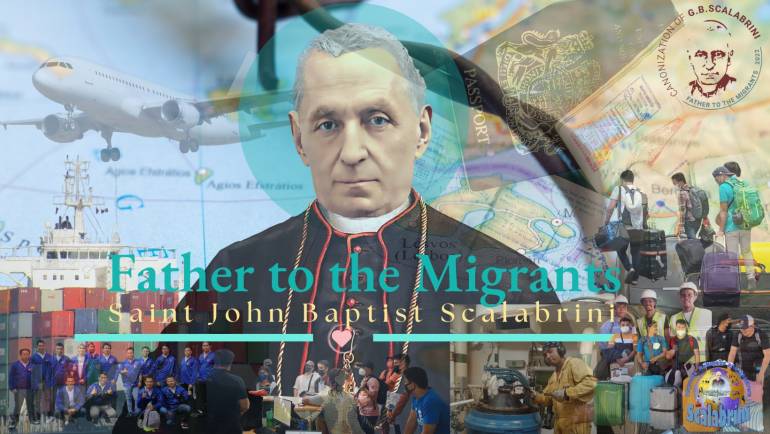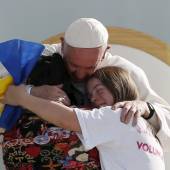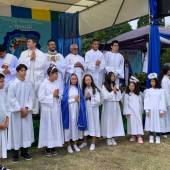Scalabrinians journey with migrants, refugees and seafarers

John Baptist Scalabrini founded the Congregation of the Missionaries of St. Charles. The members are known as Scalabrinians. They follow in the footsteps of Bishop Scalabrini, who was canonized by Pope Francis in St. Peter’s Square, on October 9.
Scalabrini, Bishop of Piacenza founded the congregation on November 28, 1887, to assist the migrants who were crossing the Atlantic to reach the Americas.
The beginnings of the congregation were humble and unpretentious: just two Italian priests who made their vows in the hands of the founder, Bishop Scalabrini.
The first mission fields were the United States and Brazil. Subsequently, keeping pace with the evolution of migration flows, they reached other countries and continents.
At present, the Congregation is present in 34 countries, with about 700 missionaries and about 400 seminarians, coming from 20 nations.
In Asia, the Scalabrinians began to expand their mission first in Manila, the Philippines, with the approval of Cardinal Jaime Sin, Archbishop of Manila, in 1982.
The first three Scalabrinian missionaries, Frs. Anthony Paganoni, Givanni Iacono, and Luiggi Sabbadin, arrived to open their mission in September-November of the same year. Then, soon after, other missions were established: Taiwan in 1994, Indonesia in 2002, Japan in 2003, and Vietnam in 2005.
The Scalabrinians in the Philippines provide a variety of services to the migrants: formation houses for Scalabrinian missionaries, pastoral care for migrants; Overseas Filipino Workers (OFWs), seafarers, fishers, human trafficking victims, and refugees.
They are also into lobbying and advocacy for migrants and are working in different church sectors. They encourage the study of migration through research centers and dialogue with political and civil groups through conferences and specialized magazines.
In September 1984, Cardinal Sin entrusted the Stella Maris, formally known as the Apostleship of the Sea, ministry to the Scalabrinians. This was the first pastoral activity entrusted to the Scalabrinians in the Philippines.
For seafarers, fishermen, and their families, Stella Maris Centers, pastoral care, and para-legal services are still available.
They also organize activities on days devoted to these people of the sea, such as National Seafarers’ Day, and give seminars to graduating maritime students. The director of East and Southeast Asia Coordinator of Stella Maris-Manila is Father Paulo Prigol, CS.
Those who stay in the Stella Maris Center feel the warm hospitality and even increase their faith in God.
Jerson Buquil, a seafarer, says, "Stela Maris is very significant for us because it provides good accommodation at a lower price so that I can save money, especially amid the pandemic. It also enables us to develop our faith in God and help each other."
And with seafarer Socrates: "I am thankful to Stella Maris for helping us and giving us spiritual guidance when we pursue our dream."
Another seafarer, Stephen Singlador, said, "I am far from my home and miss Holy Mass for months or even a year. Then Stella Maris is like my best friend, accompanies me, helps me, and guides me in times of difficulties and struggles, even when I am on board. Thanks for the hospitality."
On June 1, 1993, the Scalabrinian Center for People on the Move (SCPM) was opened. It is a non-stock and non-profit organization that serves overseas workers, seafarers, and refugees, regardless of age, gender, race, ethnic background, religion, or belief.
SCPM serves as their home away from home while they proceed with their papers and are oriented for overseas employment. It is a part of the House for Migrants Network. The director is Father Paulo Progil, CS.
Since 1984, the secretary of the Episcopal Commission for Migrants and Itinerant People (ECMI) has been a Scalabrinian missionary.
The ECMI is an operative unit of the Catholic Bishops’ Conference of the Philippines (CBCP) for the care of those involved in human mobility. Currently, Father Roger Manalo, CS, is the secretary of ECMI.
Established in 1987, the Scalabrini Migration Center (SMC) is a research center on migration from and to Asia.
SMC has a documentation section, publishes the quarterly Asian and Pacific Migration Journal, conducts research projects, and organizes conferences and seminars. It is a part of the Scalabrini Migration Study Center (SMSC) network and is currently directed by Dr. Maruja M.B. Asis.
The centers serve migrant workers, seafarers, and refugees in the Philippines.
The Scalabrinians have complete houses for formation to train the Scalabrinian missionaries: Scalabrini Formation Center (SFC) in New Manila is a seminary for languages and philosophy studies directed by Father Nguyen Quang Huynh, CS.
The Scalabrini Theological House of Studies (STHS) in New Manila is an international community for theological studies directed by Father Luis Antonio Diaz Lamus, CS, and Father Tran Quoc Bao, CS. The Scalabrini Novitiate and postulancy are located in Cebu City in the central Philippines.
On October 9, 2022, the Scalabrinians celebrate their presence in the Philippines with gratitude and renewed missionary zeal as they celebrate the canonization of their founder. They promise to continue serving migrants, refugees, and seafarers with the apostolic zeal of Saint Bishop John Baptist Scalabrini. - Nguyen Van Giang, CS
Radio Veritas Asia (RVA), a media platform of the Catholic Church, aims to share Christ. RVA started in 1969 as a continental Catholic radio station to serve Asian countries in their respective local language, thus earning the tag “the Voice of Asian Christianity.” Responding to the emerging context, RVA embraced media platforms to connect with the global Asian audience via its 21 language websites and various social media platforms.














